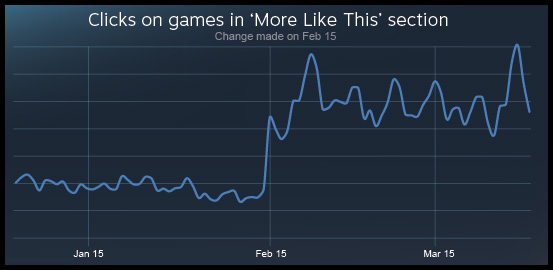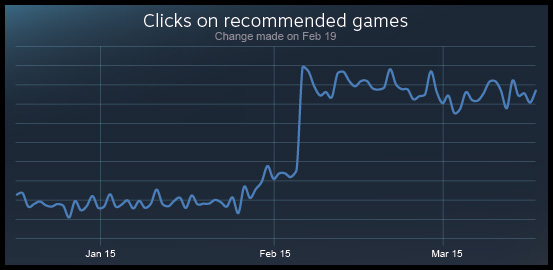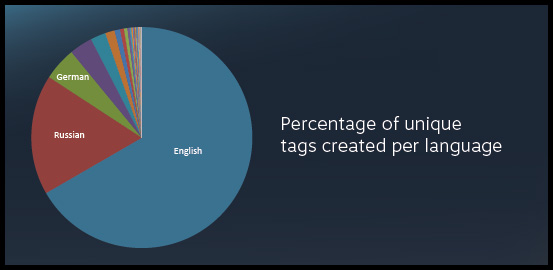With the launch of the Steam Tags beta back in February, we gave Steam customers the ability to "tag" any game or software with genres, themes, attributes, or any other term or phrase that would help customers find similar products. In the time since the feature launched, customers have applied tags more than 4 million times and across almost every product in the Steam catalog.
Our goal for Steam is to keep getting better at helping each customer find the next games that they want to play. Tags are a critical component in helping the Steam store better understand which products are related, which in turns contributes to better recommendations of games for customers. While there are a number of important components in making confident recommendations for customers, this blog post will focus primarily on tags.
So, how do we measure the effectiveness of tags? Let's start by looking at a couple areas where the store is currently generating recommendations and have been affected by the existence of tags.
If you visit a product page for a game on Steam, you'll notice a section just above the reviews called "More like this". With the addition of tags, we can better figure out which games are most closely related thematically and stylistically. As a result, the amount of traffic through the 'More like this" section of the product page has tripled, which indicates to us that customers are finding those suggestions much more relevant.
Tags are also really useful for making specific recommendations for users based on the games they have been playing recently. Before we had the tag data, visitors to the "Recommended for you" page were just presented with items on their wishlist or DLC for games they had bought. We had genres on Steam, but we found that their usage was far too broad to be useful in making recommendations for similar games (for an example of this, look at the breadth of variety in the Action genre).
With the data we have from tagging, the "Recommended for you" page can actually suggest titles related to what you've been playing, and as a result, we've seen a significant increase in the percentage of clicks on the titles being recommended.
While we were looking at the impact of tags, we discovered that a couple of early decisions we had made were holding tags back from working even better. One of those decisions was to have a separate pool of tags for each available language.
We had assumed that some languages might have cultural differences in the kind of tags or the use of tags that would generate different data that is more relevant for users in those languages. That may still be true, but the downside of having separate pools of tags outweighs any positives that may be possible. Most languages, which have fewer Steam users than English, ended up with many fewer tags applied and a higher percentage of bad data from the tags (inappropriate tags, jokes, etc.).
As a result of this finding, we are merging tags from across all the Steam languages to create one list of tags which is translated by our community translators. This means that the same tags will show up on a game for every customer, though customers may see a language-specific translation of a term if it is appropriate for their language.
Another change we are making is in how similar tags get merged together and the threshold at which new tags become part of the system.
The degree to which a tag is useful for making recommendations depends on two elements: How many people agree that it should be applied to a specific game and how accurately it associates the games it is applied to. For example, highly useful tags tend to be objective descriptions of content or theme such as "Fantasy" or "Zombies".
Unhelpful tags are ones where users don't agree on usage, or they are too general to help the recommendation system actually find related games. An example of this is the tag "Fun". Since everyone has a slightly different definition of what is fun for them, this tag tends to get applied to a huge variety of games and dilutes our ability to identify which products are actually similar.
When we dig in deeper and look at the individual tags being applied, it becomes clear that there is another category of tags where there is a commonly agreed upon concept, but with many similar spellings or phrases to communicate that concept. For example, we found 4 different variations of a term for a game that supports user modifications: "Modding", "Mod-friendly", "Moddable", "mod supported". Since it is more useful to have a single tag for a term than it is to have a bunch of really similar tags, we have merged together a number of tags. In some cases when you enter a specific tag, you will see it appear as the variation that we have merged it into. For example, if you enter the tag "Mod-friendly" on a title, you will actually see the tag "Moddable" appear.
With this set of changes, we are removing the 'beta' tag on the Steam Tags feature. This is mostly a cosmetic change, since we will continue to make improvements to the feature as we learn new things about how customers are using tags and how we can better utilize the relationships being defined between products.
If you have any feedback or encounter any issues, please continue to post in the Steam Tagging discussions here: http://steamcommunity.com/groups/Ste...discussions/2/
More...











Bookmarks